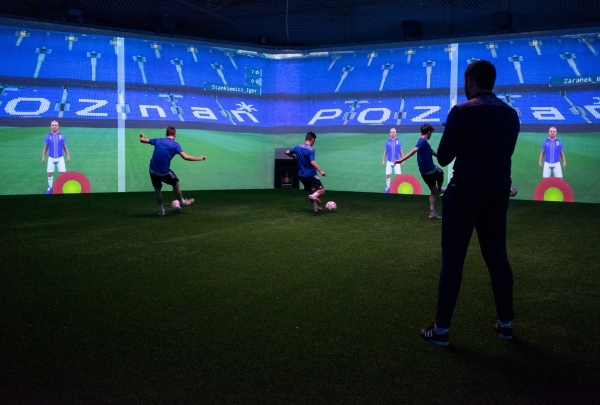
On October 21, 2010, Lech Poznań left a lasting impression in England. Although the Poles were beaten 3-1 by Manchester City in the UEFA Europa League that evening, the real highlight took place in the away sector. The 6,000 or so fans who had travelled with the team demonstrated unconditional commitment and unity with a choreography previously unknown in Manchester. The visitors’ supporters turned their backs to the pitch, everyone put their arms on their neighbor’s shoulders and the crowd began to jump up and down, singing. Since that game, “The Poznań” has also become part of the Citizens’ fans’ support repertoire and was even honored with an entry in the Cambridge Dictionary. It was not to remain Lech’s only successful export in recent years.
Success for the “Kolejorz” (“Railwaymen”), as the club is known because of its history, is no longer defined solely by match results and titles. A comprehensive strategy forms the basis of the club’s activities. Youth development plays a major role in this and is an expression of the club’s strong roots in the region. “The development of our youth players and the number of self-trained players in the first team is precisely defined in our strategy,” says Michał Kokotek, Head of Operations at the Lech Poznań Youth Academy.
Lewandowski was just the beginning
The crucial thing is to implement your own strategy consistently on a day-to-day basis, especially when developing a young talent into a professional, says Kokotek. The high number of club-trained professionals is the best motivation for the younger players in the junior ranks. There are now enough successful examples from recent years. In 2010, for example, the current star of FC Barcelona, Robert Lewandowski, transferred from Lech Poznań to Borussia Dortmund. The club’s highest transfer earnings, however, came in the past five years. Defender Jan Bednarek moved to Southampton FC, Jakub Moder signed for Brighton and Jakub Kaminski was transferred to VfL Wolfsburg in the Bundesliga. All three graduated from the Lech Academy.
These departures may have hurt from a sporting point of view, but economically they lifted the club to a new level and boosted its international reputation. “Selling players from the youth academy is part of our business model. Before that, however, these players must have demonstrated that they are ready to compete in the first team of Lech and be successful with it,” says Kokotek.
Stars as a benchmark
Part of the investment also included the construction of a dedicated skills.lab Arena, which opened in December 2021: “The skills.lab Arena allows us to develop the technical skills of our players in a way and quality unimaginable before.” In addition, the system allows the club to make ongoing objective comparisons of individual players. “There are a number of mechanisms in place at the club that we use to measure the development of players. With this, we not only record current players, but we have also recorded those who have played for us in the past.” Performances of professionals like Bednarek, Moder or Kaminski serve as benchmarks for their potential successors.
Talented players who develop similarly receive targeted support, including individually tailored technical and cognitive training in the skills.lab Arena: “Thanks to the ability to design our own exercises, we can constantly develop the training programs for individual players and groups. What is crucial is the connection between the player’s task on the pitch and his training in the Arena,” says Kokotek. Experience in day-to-day operations is helping the club to tailor training more and more precisely to the talent. Kokotek leaves it open as to who will be the next player to make a name for himself: “Every player who plays in Lech Poznań’s youth team today can form the core of our professional team in the future.” And at some point leave a lasting impression internationally as well.